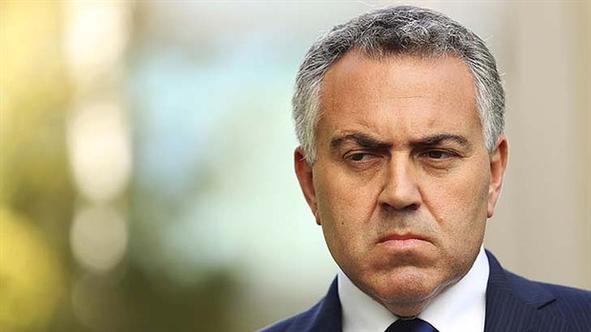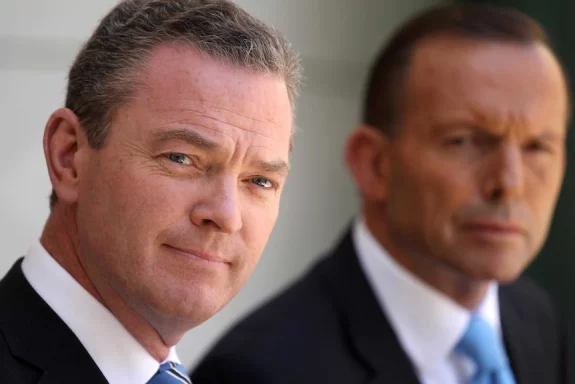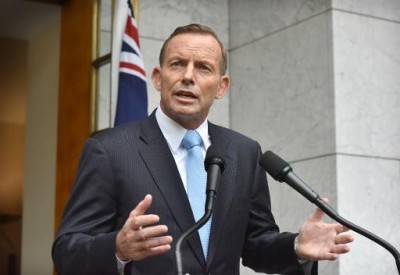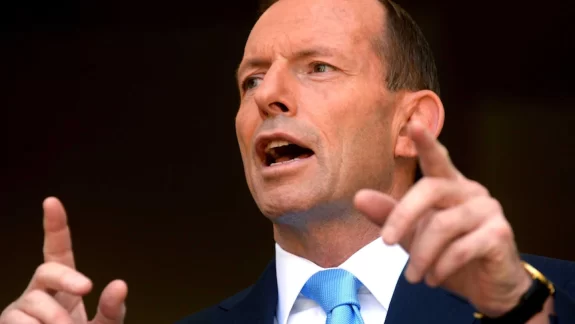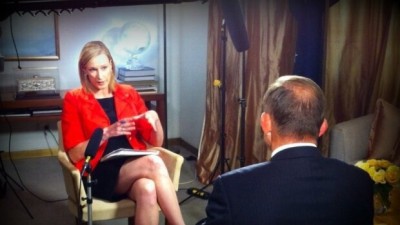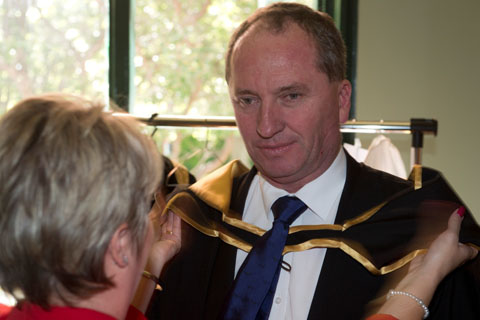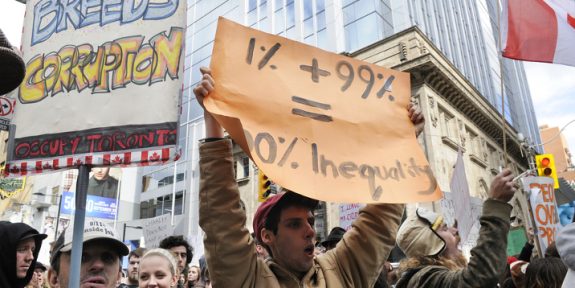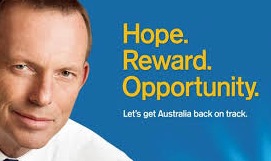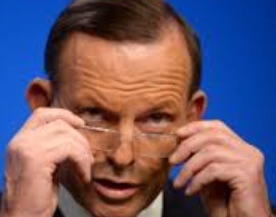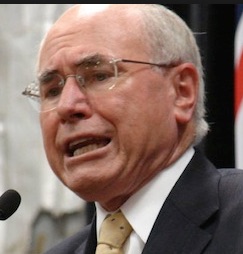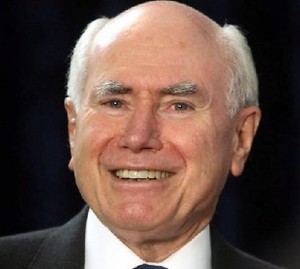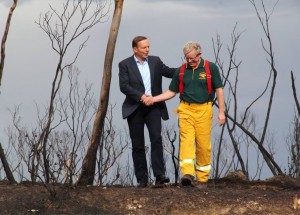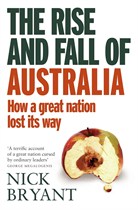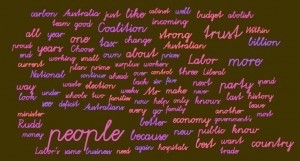The real stitch-up
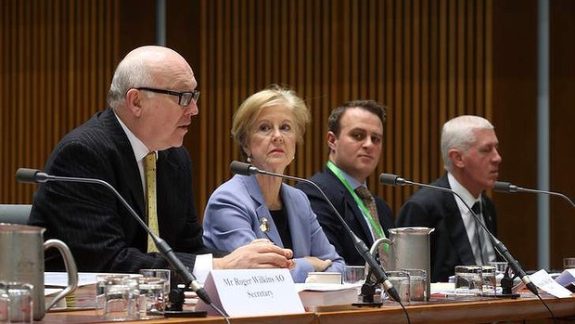
Tony Abbott has been sneeringly yelling at anyone who will listen, if there are any of those left, that the government has no confidence in Gillian Triggs because the timing of her report shows it is a “stitch up” designed to make him look bad, like he isn’t capable of doing that on his own.
I would like to point out that Ms Triggs told Senate estimates hearings in early 2013 of the HRC’s concern about children in detention and their ongoing investigation. She was slapped down by George Brandis who wasn’t interested.
In February 2013, some seven months after Ms Triggs had assumed her role at the Human Rights Commission, and seven months before the election, Senator Brandis grilled her unmercilessly about why the HRC was not spending more of their budget on defending free speech.
When she pointed out that the HRC receive about 17,500 inquiries a year of which approximately three concern political opinion “so it is a very tiny part, in answer to your question, of the complaints function of the commission”, Brandis refused to accept her explanation.
Senator BRANDIS: That may very well be so, Professor Triggs, but why has it taken people other than the Human Rights Commission to elevate this debate? Why has it taken people like my friends at the Institute of Public Affairs, some of my colleagues in the coalition, columnists, editorial writers and writers of letters to the editors of the newspapers to get a debate up and going in Australia about limitations on freedom, when we have an agency, your agency, whose explicit statutory charter is to promote and advance those rights?
Prof. Triggs: I wonder if I could take another point here. I accept your question. I think it is a valuable one, as I have said. But let us look at another element of this – that is, a great deal of my time as president and that of many members of our human rights law and policy group has been responding to our profound concerns about the mandatory detention of asylum seekers. I understand that at the moment we have many thousands – and I do not know the exact number, but let us say 6,000 people – in mandatory detention in Australia, including children. Many have been there for years. Babies have been born within that environment. They have been charged with no offence, and they have not yet had their claims to refugee status assessed. That is an area that I think is of fundamental importance to human rights.
Senator BRANDIS: Well, it is.
Prof. Triggs: It concerns arbitrary detention without trial. If I may say so, I went to an interesting lecture by the foreign minister the other day to celebrate the Magna Carta, quoting the fundamental principles of the Magna Carta that no man – or presumably woman – can be charged or held without a trial of their peers. It seems extraordinary.
Senator BRANDIS: I do not think the barons at Runnymede had friends like Mr Eddie Obeid and Mr Ian Macdonald, unlike our foreign minister, who speaks with eloquence about the Magna Carta, at least.
Brandis mentions several times his “friends at the IPA”
“Whereas your commission is a dedicated and committed advocate of antidiscrimination principles, I do not see the commission being a dedicated and committed advocate of freedom principles. You have think tanks, like in the Institute of Public Affairs, which has something called a ‘freedom project’. I do not see a freedom project in the Human Rights Commission.”
Senator Brandis finishes with what was no doubt his aim all along.
Senator BRANDIS: My last question. Your commission does seem to have a superabundance of discrimination commissioners in various areas. Should the Human Rights Commission have a freedom commissioner whose particular brief is to promote the kind of balance of which you speak so that within the commission there is a person whose particular job is to promote freedom, just as, within the commission at the moment, there are, I think, five commissioners whose particular job is to promote antidiscrimination? Would that not be a desirable balance – one freedom person versus five anti-discrimination people?
Come on down, Timmy!
A couple of months later, in April 2013, Brandis attended the IPA 70th birthday bash. He obviously enjoyed himself because he has been rewarding them ever since.
As soon as he assumed office, Brandis gifted to Tim Wilson a $400,000 a year job as a Human Rights Commissioner despite his “woefully inadequate” qualifications. It seems apparent that Wilson was appointed to destroy from within and, if worst comes to worst and he can’t abolish the HRC as he wants, then Tim will probably be offered the top job after the “anonymous” leaks about Triggs wanting to get out.
After the predictable backlash to this obvious act of cronyism, George wrote an article in The Australian condemning those who criticized his choice.
“But some things never change, like the reaction of the claque of bilious pseudo-intellectuals who constitute what passes for a left-wing commentariat in this country. Mike Carlton, Catherine Deveney, Van Badham and their ilk were nothing if not boorishly predictable. They and their followers unleashed a storm of hatred and bile against Wilson on social media, the like of which I have never seen.”
Or perhaps they just thought that sacking the Disability Commissioner to employ your unqualified inexperienced ideologically opposed little friend was a step too far? And is that any way for the highest legal officer in the land to speak?
This was all the more hypocritical considering Brandis, in opposition, had previously taken to the Australian to excoriate the appointment by Mark Dreyfus of Labor staffer-turned-intellectual Tim Soutphommasane as Australia’s Race Discrimination Commissioner at the Australian Human Rights Commission, a role for which he was eminently qualified, labelling him as “yet another partisan of the Left”.
Dr Soutphommasane graduated from the University of Sydney with a first-class honours degree. He was then a Commonwealth Scholar and Jowett Senior Scholar at Balliol College of the University of Oxford where he completed a Master of Philosophy with distinction and a Doctor of Philosophy in political theory.
From 2010 to 2012 he was a Lecturer in Australian Studies and a Research Fellow at the National Centre for Australian Studies of Monash University.
Soutphommasane is the author of three books: The Virtuous Citizen: Patriotism in a Multicultural Society (Cambridge University Press, 2012), Don’t Go Back To Where You Came From: Why Multiculturalism Works (New South Books, 2012) which in 2013 won the NSW Premier’s Literary Award in the ‘Community Relations Commission Award’ section, and Reclaiming Patriotism: Nation-Building for Australian Progressives (Cambridge University Press, 2009).
By contrast, Wilson has a Bachelor of Arts and a Masters of Diplomacy and Trade from Monash University. He worked at the Institute of Public Affairs for seven years. He was a vocal critic of the Human Rights Commission and during his time there the IPA called for the abolition of the commission.
After his “surprise”appointment, Wilson wrote that:
“Attorney-General George Brandis has asked me, as Australia’s next human rights commissioner, to focus on traditional liberal democratic and common law rights, particularly article 19 of the International Covenant on Civil and Political Rights.
All rights should be defended, but the human right most being neglected is free speech. Arguably freedom of speech is the most important human right. It is the human right necessary to protect and defend all other human rights.
Article 19 of the covenant states: “Everyone shall have the right to freedom of expression; this right shall include freedom to seek, receive and impart information and ideas of all kinds, regardless of frontiers, either orally, in writing or in print, in the form of art, or through any other media of his choice.”
Article 19 ought to be the human rights community’s starting point. But at the moment it seems more like a footnote.
Increasingly free speech has been pushed aside in favour of laws and regulations designed to stop people being offensive to each other, a steadily expanding corpus of anti-discrimination and defamation law, and the growing momentum towards restrictions on speech online.”
Whilst the Attorney General may appoint people to the HRC, I am not sure he has the power to direct them then what to say and do, and I am wondering how Tim feels about George’s recent announcement of devoting $17 million to monitor social media to take down terrorist propaganda
When the two Tims attended Senate estimates hearings in May 2014 to discuss proposed changes to Section 18C of the racial discrimination act, George Brandis objected to Tim Soutphommasane giving his opinion even though he is the Racial Discrimination Commissioner. Ian Macdonald, coincidentally, was also chairing this meeting as he was with the recent meeting with Gillian Triggs and he upheld Senator Brandis’ objection saying his opinion had no place in the discussion (see video here).
But later in the hearing, Tim Wilson was allowed to re-state, at length, his clear support for changing the Act.
After the hearing, Senator Singh said Dr Soutphommasane ”was gagged, in complete contradiction to Tim Wilson who was able to share his views on the RDA. Senator Brandis initially stopped me from asking the question and accused me of being dishonest in asking for Dr Soutphommasane’s views. This is a man who stands for freedom of speech yet won’t allow a witness at the table to speak.”
This absolute championing of freedom of speech seems very much at odds with Tony Abbott’s stand against Hizb ut-Tahrir, taken after Alan Jones urged him to “proscribe the movement”.
“We are changing the law that will make it easier to ban organisations like Hizb ut-Tahrir. But before that even we should have a system in place which red cards these hate preachers and stops them coming to Australia.”
The response from our “Freedom Commissioner” was totally devoid of any legal facts, or gumption for that matter, as reported by Michelle Grattan in October:
“Wilson fears florid talk about “hate speech” can “justify censorship all over the place”. He is considering putting in a personal submission to the current parliamentary inquiry into the legislation, urging a tighter definition of the advocacy of terrorism. Wilson says it is unclear where the line would be between the advocacy of terrorism and for example attacking the coalition’s air strikes in the Middle East.”
Apparently, he either didn’t get around to his “personal submission” or it was ignored.
Abbott is right…this has been a stitch-up – one that began well before George Brandis was in a position to reward his “friends at the IPA” and, with the help of Senator Macdonald, take his revenge on that pesky woman.
Like what we do at The AIMN?
You’ll like it even more knowing that your donation will help us to keep up the good fight.
Chuck in a few bucks and see just how far it goes!
Your contribution to help with the running costs of this site will be gratefully accepted.
You can donate through PayPal or credit card via the button below, or donate via bank transfer: BSB: 062500; A/c no: 10495969











